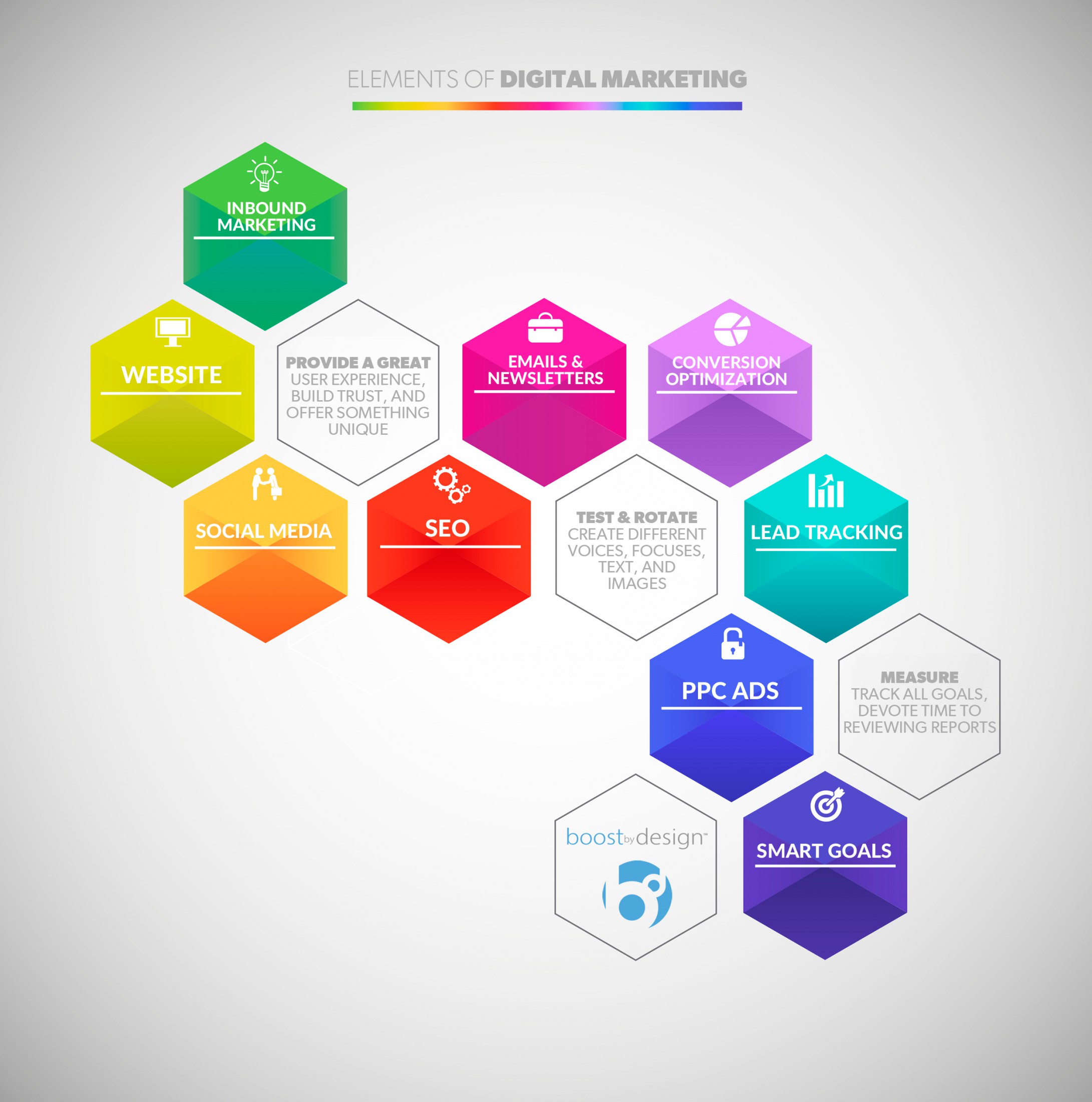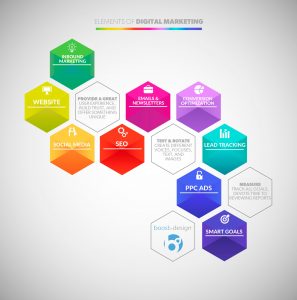Digital Marketing Beginner’s Guide
Posted by Jeremy
on 09/14/15

What is Digital Marketing?
Before we head off into the weeds of the digital marketing landscape it’s probably a good idea to define just what we mean by the term. According to the Financial Times,
“Digital marketing is an umbrella term for the targeted, measurable, and interactive marketing of products or services using digital technologies to reach and convert leads into customers. It is embodied by an extensive selection of service, product and brand marketing tactics, which mainly use the Internet as a core promotional medium…”
To make that even more simple it’s all the digital tactics and strategies you can use to convert bystanders into customers.
This encompasses a lot of different marketing avenues which we’ll breakdown in detail below. If you read our beginner’s guide to SEO you may be thinking that this sounds pretty similar to search engine optimization. While there are numerous overlaps their goals are very different. Imagine a pair of runner’s shoes, pretty similar but try wearing them on the opposite foot and you’ll realize that similar does not mean the same.
Digital Marketing vs SEO
Digital Marketing and SEO each serve a purpose and create the best ROI when paired together. You can run a race with just one shoe on but we wouldn’t recommend it (blisters and heel spurs aside).
SEO is primarily concerned with increasing your SERPs rankings and visitor traffic (both organic and paid). Digital Marketing is focused on efficiently converting as many of those visitors as possible into customers. Many business owners view marketing as an additional expenditure. You should remember however, that expenses are only expenses if they don’t generate sales.
This is why one of the major KPIs (Key Performance Indicators) is Return On Investment. It’s also why a digital strategy should be constantly evolving through A/B testing, subtle messaging, user experience, and a whole lot more.
“It’s much easier to double your business by doubling your conversion rate than by doubling your traffic.” –Jeff Eisenberg
Elements Of A Digital Marketing Plan
Your Website
This is pretty much a given, your website is the destination for potential customers looking for information, services, and reasons to choose you over a competitor. Your website should provide a pleasant experience, easy access to any information a visitor is looking for, and aim to build trust in your brand.
Conversion Optimization
There are many, many tactics used but there’s only one goal. Subtly funnel a visitor to take the specific action you want for that page. Some core optimizations include ensuring each page has one focus, creating strong Call-To-Actions, and A/B Testing your messages and actions.
Lead Tracking
Leads and conversions are a pretty important metric, otherwise how can you tell how successful your strategy is? There are many different avenues to track such as phone calls, emails, newsletter signups, walk-ins, etc. The more real-time your tracking is the quicker you can respond to changes, like the 24/7 marketing dashboard for out clients.
Social Media Marketing
Social networking can be a powerful marketing tool. It allows your business to instantly interact with the public and manage it’s image. It can be invaluable to providing deeper insight into potential customers desires with their informal atmosphere. Advertising your business through your social networking can also be a cost effective second channel.
Email Marketing
Digital Marketing strategies can and should include email marketing. Even though email marketing is not new it stills holds one of the highest conversion rates. It’s a great tactic for converting past customers into active customers. Email Marketing is also an effective remarketing tool for keeping your business and services in the minds of potential customers.
Pay Per Click Ads (PPC)
These are the ads seen on search engines results pages and can be very useful for increasing brand recognition and super charging your exposure during important fiscal periods or product launches. These ads can be both standard text ads or media rich display ads.
Remarketing Ads
These ads fall under PPC ads but don’t display on search engines. Instead these ads “follow” visitors that have previously viewed your site to other sites. For example, a potential customer is price shopping for a service and takes a break to look at a news website. Remarketing ads for your business then appear on a sidebar of that site, keeping you in that visitor’s mind.
Inbound Marketing
This marketing involves sharing something valuable to any potential customers for free. Not only can it establish you as a knowledgeable industry leader, it also builds trust, and generates goodwill. It can provide a good lead capture area and can be as simple as a free estimate, downloadable PDF, or something relevant to what customers want.
SEO
Search Engine Optimization is it’s own beast but like we mentioned goes hand-in-hand with Digital Marketing. Increasing your website’s rankings and traffic increases the exposure to more potential customers. This is a long-term strategy that has many factors to consider to contribute to success.
“Take a risk and keep testing, because what works today won’t work tomorrow, but what worked yesterday may work again.”
-Amrita Sahasrabudhe
I Love It When A (Digital Marketing) Plan Comes Together
Creating a marketing strategy requires two different types of thinking to be successful. In the beginning there needs to be clear visions, goals, and tactics. After your strategy is underway you need to be flexible enough to add, remove, or change elements of your strategy. Look to what’s working or any new developments in your industry.
There are acronyms galore in this industry but one I’m fond of is:
Specific Measurable Actionable Realistic Timed
SMART goals help segment each aspect of planning and keep you from becoming overwhelmed when creating a Digital Marketing strategy.

